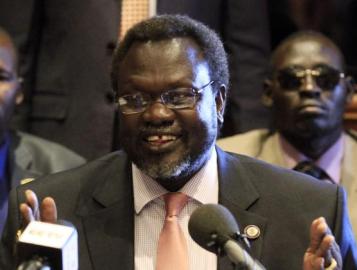S. Sudanese rebels say former detainees “undecided”
May 20, 2014 (ADDIS ABABA) – The South Sudanese faction of the ruling Sudan People’s Liberation Movement (SPLM), which has formed an “armed resistance” against president Salva Kiir’s government, said the 12 former colleagues freed from detention in Juba including the former secretary general of the party, Pagan Amum, have not decided which side to join in resolving the new nation’s five-month old conflict.

Under the leadership of the former vice-president and the then deputy chairman of the ruling SPLM, Riek Machar, the now SPLM (in opposition) have been battling Kiir’s government since mid-December 2013.
The group include Pagan Amum, former SPLM secretary general, Mama Robecca Nyandeng, presidential advisor and widow of late leader John Garang, Deng Alor, former cabinet affairs minister, John Luk, former justice minister, Kosti Manibe, former finance minister, Oyai Deng, former security minister, Gier Chuang, former minister for roads, Madut Biar, former minister of telecommunications, Majak Agot, former deputy defense minister, Cirino Hiteng, former youth minister, Chol Tong, former Lakes state governor and Ezekiel Lol, former diplomat to US.
Prior to the 15 December violence which erupted in South Sudan last year, the politicians who are senior members in the SPLM, were allied to the former party deputy chairman, Riek Machar, in which they on 6 December 2013 held a press conference in Juba, calling for political reforms in the party and accusing the party chairman, Salva Kiir of “dictatorial tendencies.”
Following the violence, they were all arrested, except Robecca Nyandeng. Seven of them were released two months later, but Pagan Amum, Oyai Deng, Majak Agot and Ezekiel Lol remained in detention, accused of alleged coup attempt. They were, however, released five months later for lack of evidences to support the alleged coup.
The first seven released former detainees however played an insignificant, sometimes denied, neutral position in the peace talks, calling themselves a “third bloc” which did not want to join either side in the conflict, despite being named by Machar as members of his delegation and demanded for their release throughout the peace talks.
Dak, however, said the ex-detainees had the right to decide how to behave in this crisis in the history of the country despite being one group with Machar prior to the “imposed violence.”
“Our leadership acknowledges the right of the former detainees to choose what to do after their freedom. We were one group before the violence during which we together tried peaceful reforms,” he further stressed.
“They also agree that the violence was imposed on us and the people of South Sudan by Salva Kiir. They may disagree with us on how to deter that violent dictatorship,” Dak added, while referring to the armed movement which Machar has formed.
Machar’s spokesperson said the rebels were committed to the peace process to end the crisis, but would continue “to resist the dictatorial regime in Juba using the armed resistance as an alternative tool to deter and put pressure on Salva Kiir to talk peace and negotiate himself out of power.”
“We are convinced that the leadership in Juba is an avowed violent form of dictatorship. They are against peaceful political reforms in the country. They have proved it to the whole world in December last year. It is therefore strange if others do not see the necessity of forming an armed resistance in order to deter them,” Dak added.
However, despite lack of declaration to join with the armed opposition group as an organic organization, Pagan Amum on Sunday held a follow-up consultative meeting with Machar in Addis Ababa in which the former detainees pledged to cooperate and collaborate with the rebels against the government.
Analysts see the position adopted by the former detainees as an attempt to make themselves look like “good guys” in the eyes of the international community so that they may snatch the proposed interim government’s leadership if both president Salva Kiir and opposition leader, Riek Machar, were to be forced to step aside.
Nonetheless, the recent shift in the roadmap agreement which necessitated Kiir and Machar to spearhead and negotiate the terms of the transitional governance and its leadership provided slim chance for the former detainees to lead the transition.
The five-month old violent conflict, which has killed tens of thousands and displaced over a million people, erupted when president Salva Kiir allegedly his presidential guards unit commander to disarm the Nuer soldiers within the guards.
A shaky peace talks to resolve the conflict has been ongoing in the Ethiopian capital, Addis Ababa, under the auspices of the Intergovernmental Authority on Development (IGAD).
The rebel group is expected to submit its positions to the mediation team on issues of federal system of governance, legislature, judicial and legal reform, security sector reform, economy, constitution, public services reform, national reconciliation and healing as well as census and elections, among others.
The rebels have demanded the restructure of the state on the basis of a new peace agreement and a federal constitution. Government on the other hand has been resisting the call to restructure the state on the basis of federalism.
On 9 May, president Kiir and opposition leader Machar signed a road map agreement in the Ethiopian capital, which shall guide further negotiations between their delegations.
(ST)
